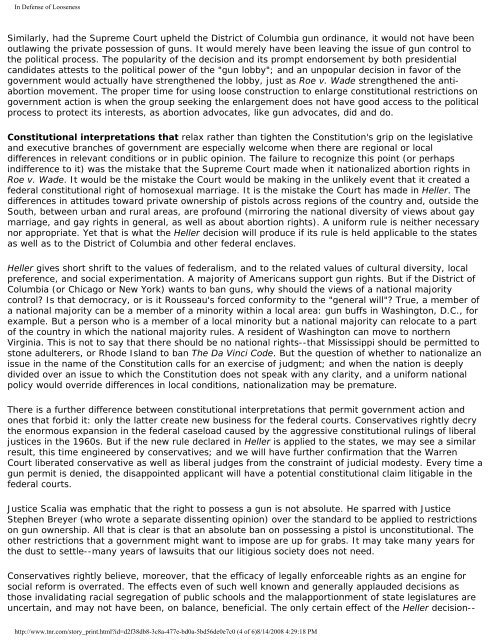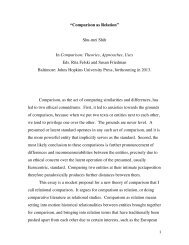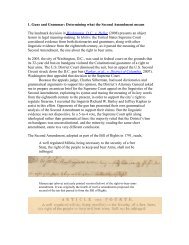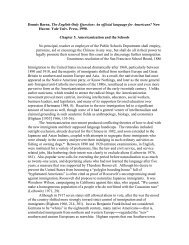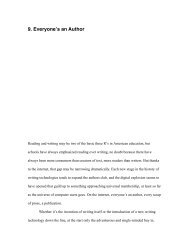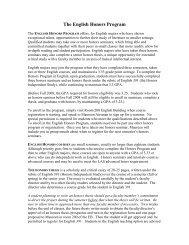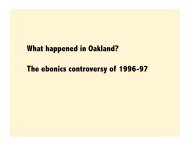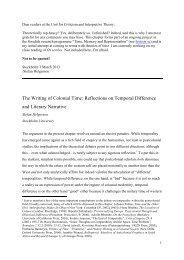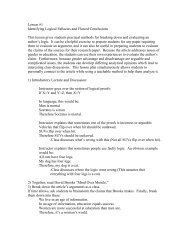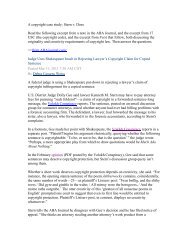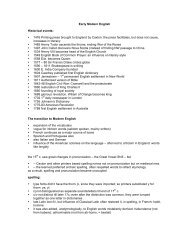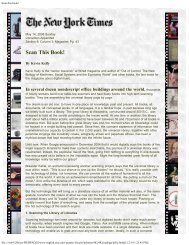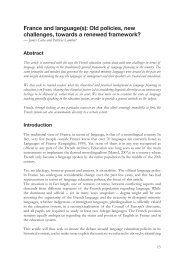Richard Posner: In Defense of Looseness - English
Richard Posner: In Defense of Looseness - English
Richard Posner: In Defense of Looseness - English
You also want an ePaper? Increase the reach of your titles
YUMPU automatically turns print PDFs into web optimized ePapers that Google loves.
<strong>In</strong> <strong>Defense</strong> <strong>of</strong> <strong>Looseness</strong>Similarly, had the Supreme Court upheld the District <strong>of</strong> Columbia gun ordinance, it would not have beenoutlawing the private possession <strong>of</strong> guns. It would merely have been leaving the issue <strong>of</strong> gun control tothe political process. The popularity <strong>of</strong> the decision and its prompt endorsement by both presidentialcandidates attests to the political power <strong>of</strong> the "gun lobby"; and an unpopular decision in favor <strong>of</strong> thegovernment would actually have strengthened the lobby, just as Roe v. Wade strengthened the antiabortionmovement. The proper time for using loose construction to enlarge constitutional restrictions ongovernment action is when the group seeking the enlargement does not have good access to the politicalprocess to protect its interests, as abortion advocates, like gun advocates, did and do.Constitutional interpretations that relax rather than tighten the Constitution's grip on the legislativeand executive branches <strong>of</strong> government are especially welcome when there are regional or localdifferences in relevant conditions or in public opinion. The failure to recognize this point (or perhapsindifference to it) was the mistake that the Supreme Court made when it nationalized abortion rights inRoe v. Wade. It would be the mistake the Court would be making in the unlikely event that it created afederal constitutional right <strong>of</strong> homosexual marriage. It is the mistake the Court has made in Heller. Thedifferences in attitudes toward private ownership <strong>of</strong> pistols across regions <strong>of</strong> the country and, outside theSouth, between urban and rural areas, are pr<strong>of</strong>ound (mirroring the national diversity <strong>of</strong> views about gaymarriage, and gay rights in general, as well as about abortion rights). A uniform rule is neither necessarynor appropriate. Yet that is what the Heller decision will produce if its rule is held applicable to the statesas well as to the District <strong>of</strong> Columbia and other federal enclaves.Heller gives short shrift to the values <strong>of</strong> federalism, and to the related values <strong>of</strong> cultural diversity, localpreference, and social experimentation. A majority <strong>of</strong> Americans support gun rights. But if the District <strong>of</strong>Columbia (or Chicago or New York) wants to ban guns, why should the views <strong>of</strong> a national majoritycontrol? Is that democracy, or is it Rousseau's forced conformity to the "general will"? True, a member <strong>of</strong>a national majority can be a member <strong>of</strong> a minority within a local area: gun buffs in Washington, D.C., forexample. But a person who is a member <strong>of</strong> a local minority but a national majority can relocate to a part<strong>of</strong> the country in which the national majority rules. A resident <strong>of</strong> Washington can move to northernVirginia. This is not to say that there should be no national rights--that Mississippi should be permitted tostone adulterers, or Rhode Island to ban The Da Vinci Code. But the question <strong>of</strong> whether to nationalize anissue in the name <strong>of</strong> the Constitution calls for an exercise <strong>of</strong> judgment; and when the nation is deeplydivided over an issue to which the Constitution does not speak with any clarity, and a uniform nationalpolicy would override differences in local conditions, nationalization may be premature.There is a further difference between constitutional interpretations that permit government action andones that forbid it: only the latter create new business for the federal courts. Conservatives rightly decrythe enormous expansion in the federal caseload caused by the aggressive constitutional rulings <strong>of</strong> liberaljustices in the 1960s. But if the new rule declared in Heller is applied to the states, we may see a similarresult, this time engineered by conservatives; and we will have further confirmation that the WarrenCourt liberated conservative as well as liberal judges from the constraint <strong>of</strong> judicial modesty. Every time agun permit is denied, the disappointed applicant will have a potential constitutional claim litigable in thefederal courts.Justice Scalia was emphatic that the right to possess a gun is not absolute. He sparred with JusticeStephen Breyer (who wrote a separate dissenting opinion) over the standard to be applied to restrictionson gun ownership. All that is clear is that an absolute ban on possessing a pistol is unconstitutional. Theother restrictions that a government might want to impose are up for grabs. It may take many years forthe dust to settle--many years <strong>of</strong> lawsuits that our litigious society does not need.Conservatives rightly believe, moreover, that the efficacy <strong>of</strong> legally enforceable rights as an engine forsocial reform is overrated. The effects even <strong>of</strong> such well known and generally applauded decisions asthose invalidating racial segregation <strong>of</strong> public schools and the malapportionment <strong>of</strong> state legislatures areuncertain, and may not have been, on balance, beneficial. The only certain effect <strong>of</strong> the Heller decision--http://www.tnr.com/story_print.html?id=d2f38db8-3c8a-477e-bd0a-5bd56de0e7c0 (4 <strong>of</strong> 6)8/14/2008 4:29:18 PM


